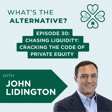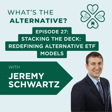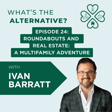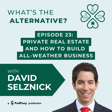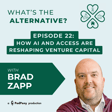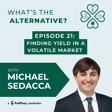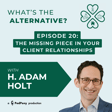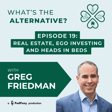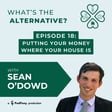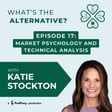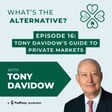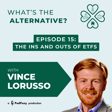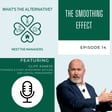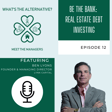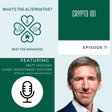
What's the Alternative? | Episode 13 | Micro Private Equity: Investing in Small Business featuring Mike Vranjkovic
Welcome to Banrion Capital Management’s What’s the Alternative Podcast! Join host Shana Orczyk Sissel, the “Queen of Alternatives” Founder & CEO of Banrion Capital Management, as she interviews leaders in the alternative investment space. Learn more about their firms, their passions and about the many different ways investors can use alternative investments to add value in their investment portfolios.
In this episode Shana sits down with Mike Vranjkovic, Managing Partner & Co-Founder at WebStreet, a firm that specializes in Micro Private Equity investing with a primary focus on e-commerce businesses.
Mike Vranjkovic is the Managing Partner at WebStreet, bringing extensive experience in finance and online business. He co-founded WebStreet with Justin Cooke and Joe Magnotti, the owners of Empire Flippers, the world's leading marketplace for buying and selling profitable online businesses. With over a decade of experience in the online sector, Mike has managed multiple departments at Empire Flippers and has been involved in hundreds of online business transactions. Following his tenure at Empire Flippers, he successfully launched several online ventures, including a seven-figure eCommerce brand. Mike began his career in finance in Chicago and holds a degree from DePaul University.
Learn More About WebStreet: WebStreet (Formerly Empire Flippers Capital)
Connect with WebStreet on 𝕏: @WebStreetLLC
Learn More About Banrion: Banrion Capital Management
Connect with Banrion on 𝕏: @Banrion_Capital
Connect with Shana on LinkedIn: Shana Orczyk Sissel
Connect with Shana on 𝕏: @shanas621
If you are an advisor wanting to check out our platform, we want to hear your feedback!
Important Disclosures:
The opinions expressed on the “What’s the Alternative Podcast” are for general informational purposes only and are not intended to provide specific advice or recommendations for any individual or on any specific security.
It is only intended to provide education about the financial industry. To determine which investments may be appropriate for you, consult your financial advisor prior to investing. Any past performance discussed during this program is no guarantee of future results.
The guests featured on this program are participants on Banrion Capital Management’s platform. As such Banrion may receive payment for their participation as a platform partner.
Any indices referenced for comparison are unmanaged and cannot be invested into directly. As always please remember investing involves risk and possible loss of principal capital; please seek advice from a licensed professional.
Investments are not FDIC-insured, nor are they deposits of or guaranteed by a bank or any other entity, so they may lose value.
Investors should carefully consider investment objectives, risks, charges and expenses. This and other important information is contained in the fund prospectuses and summary prospectuses, which can be obtained from a financial professional and should be read carefully before investing.
Statements attributed to an individual represent the opinions of that individual as of the date published and do not necessarily reflect the opinions of Banrion Capital Management or its affiliates. This information is intended to provide educational value, highlight iss
